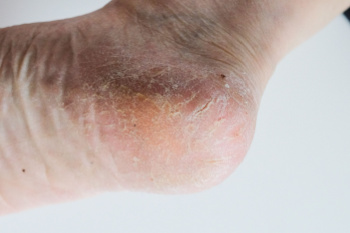

Cracked heels, also known as heel fissures, can be caused by various factors that affect foot health. Diabetes can lead to poor circulation and dry skin, increasing the risk of cracked heels. Hypothyroidism, a condition where the thyroid does not produce enough hormones, can also cause dry skin and thickened skin around the heels. Skin conditions like psoriasis and eczema can contribute to cracked heels due to dryness and irritation. Fungal infections, such as athlete’s foot, can cause the skin on the feet to peel, crack, and become inflamed. Additionally, a vitamin deficiency, especially in zinc or omega-3 fatty acids, can lead to skin issues, including cracked heels. Keeping feet moisturized, treating underlying health conditions, and practicing proper foot care are essential to prevent and manage cracked heels. Cracked heels can be painful and unsightly. If you have developed this condition, it is suggested that you schedule an appointment with a podiatrist who can successfully treat cracked heels, which often includes prescribed medication.
Cracked heels are unsightly and can cause further damage to your shoes and feet. If you have any concerns, contact Dr. Nooshin Zolfaghari from VIP Foot & Ankle Center. Our doctor can provide the care you need to keep you pain-free and on your feet.
Cracked Heels
Cracked heels appear unappealing and can make it harder for you walk around in sandals. Aside from looking unpleasant, cracked heels can also tear stockings, socks, and wear out your shoes. There are several methods to help restore a cracked heel and prevent further damage.
How Do You Get Them?
Dry skin is the number one culprit in creating cracked heels. Many athletes, walkers, joggers, and even swimmers suffer from cracked heels. Age and skin oil production play a role to getting cracked heels as well.
Promote Healing
Over the counter medicines can help, especially for those that need instant relief or who suffer from chronic dry feet.
Wear Socks – Wearing socks with medicated creams helps lock in moisture.
Moisturizers – Applying both day and night will help alleviate dryness which causes cracking.
Pumice Stones – These exfoliate and remove dead skin, which allows for smoother moisturizer application and better absorption into the skin.
Change in Diet
Eating healthy with a well-balanced diet will give the skin a fresh and radiant look. Your body responds to the kinds of food you ingest. Omega-3 fatty acids and zinc supplements can also revitalize skin tissue.
Most importantly, seek professional help if unsure how to proceed in treating cracked heels. A podiatrist will help you with any questions or information needed.
If you have any questions, please feel free to contact our office located in Pembroke Pines, FL . We offer the newest diagnostic and treatment technologies for all your foot care needs.